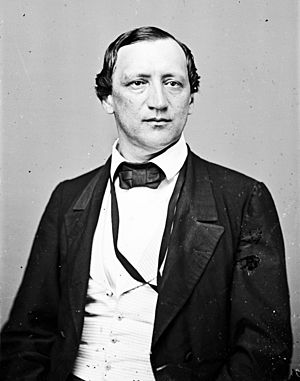John S. Carlile facts for kids
Quick facts for kids
John Snyder Carlile
|
|
|---|---|
 |
|
| United States Senator from Virginia |
|
| In office July 9, 1861 – March 4, 1865 |
|
| Preceded by | Robert M. T. Hunter |
| Succeeded by | John W. Johnston |
| Member of the U.S. House of Representatives from Virginia's 11th district |
|
| In office March 4, 1855 – March 3, 1857 |
|
| Preceded by | Charles S. Lewis |
| Succeeded by | Albert G. Jenkins |
| In office March 4, 1861 – July 9, 1861 |
|
| Preceded by | Albert G. Jenkins |
| Succeeded by | Jacob B. Blair |
| Member of the Virginia Senate | |
| In office 1847–1851 |
|
| Personal details | |
| Born | December 16, 1817 Winchester, Virginia |
| Died | October 24, 1878 (aged 60) Clarksburg, West Virginia |
| Political party | Unionist |
| Spouse | Mary Ellen Gittings |
| Profession | Lawyer, politician |
John Snyder Carlile (December 16, 1817 – October 24, 1878) was an American businessman, lawyer, and politician. He even served as a United States Senator. During the American Civil War, he strongly supported the United States. He represented the part of Virginia that stayed loyal to the Union, which later became the state of West Virginia.
Contents
Early Life and Career
John Carlile was born in Winchester, Virginia. His mother taught him at home until he was fourteen years old. At that age, he started working as a salesman in a store. By the time he was seventeen, he had started his own business.
Later, Carlile decided to study law. He became a lawyer in 1840 and began his practice in Beverly. He then entered the world of politics, joining the Democratic Party.
Political Beginnings
Carlile became a delegate to the Virginia state constitutional convention in 1850. This was a meeting where people discussed and wrote new rules for the state's government. He also served in the Virginia State Senate from 1847 to 1851.
In 1854, Carlile joined a new political group called the Know Nothing movement. He then represented Virginia's 11th District in the U.S. House of Representatives for one term.
Role in the Civil War
As the country faced the American Civil War, Carlile was a delegate from Harrison County to the Virginia secession convention in 1861. This convention was held to decide if Virginia would leave the United States. Carlile voted no on the resolution to secede.
Leading the Union Cause
Carlile was a key leader in the movement against secession. He played an important role in the Wheeling Convention in June 1861. At this meeting, on June 13, 1861, Carlile wrote a document called "A Declaration of the People of Virginia."
This document stated that Virginia's decision to leave the Union was illegal. It argued that the convention that made this decision was not set up correctly. The declaration also called for a new government for Virginia. It said that because Virginia chose to secede, all state government offices were now empty.
Restored Government and Senate Term
The pro-Union group formed the Restored Government of Virginia. This new government was quickly recognized by President Abraham Lincoln and the U.S. Congress as the true government of Virginia. Wheeling became its temporary capital.
Carlile was chosen to go to Congress again in 1861 as a member of the Unionist Party. He served in the House of Representatives from July 4 to July 13. After that, he was elected as one of two U.S. Senators representing the Restored Government. He served in the Senate until 1865.
In the Senate, Carlile believed in a strict reading of the Constitution. He opposed ideas that treated states as if they were rebelling instead of individuals. He also believed Congress should not interfere with the issue of slavery. Carlile often met with President Lincoln to try and get his support for his ideas.
Later Life
After the Civil War ended, John Carlile left politics. He went back home and continued his work as a lawyer. He passed away in Clarksburg, West Virginia, and was buried in the Odd Fellows Cemetery.
 | Precious Adams |
 | Lauren Anderson |
 | Janet Collins |

